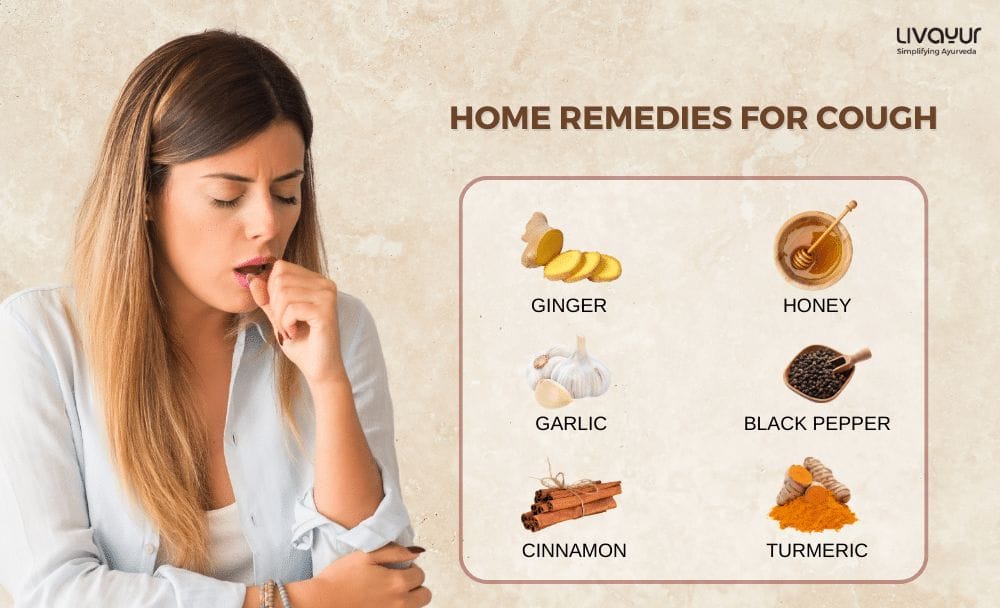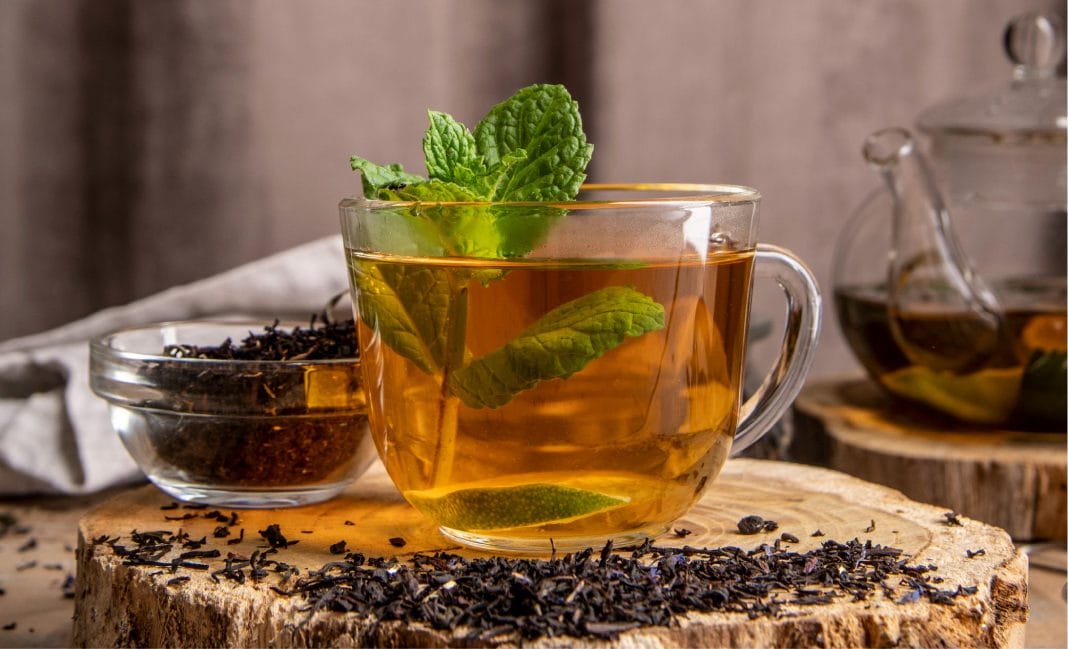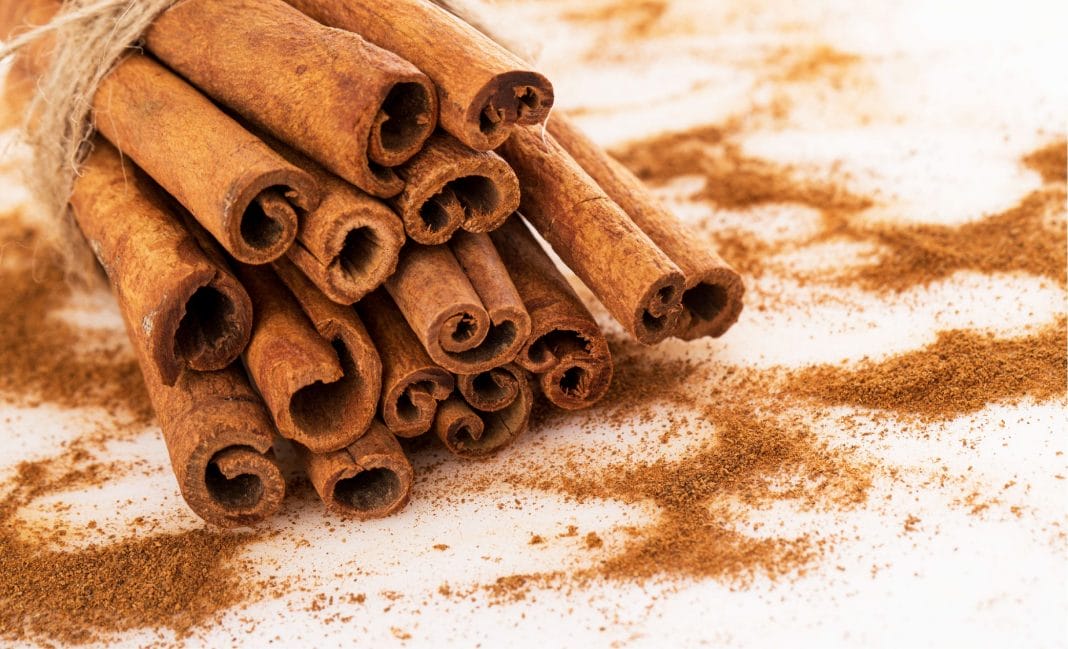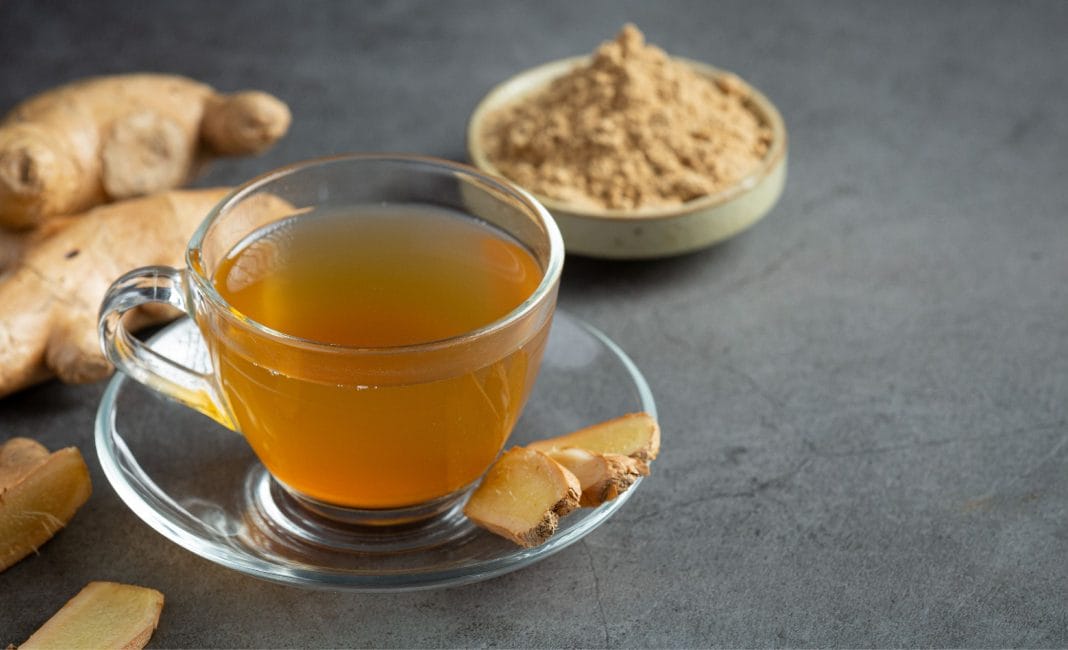
This article is reviewed by an expert
Cough is a common respiratory condition that can affect people of all ages. While there are many over-the-counter medications that can provide relief, home remedies are also effective in managing cough symptoms. Ayurvedic remedies have been used for centuries to treat cough and other respiratory ailments. In this article, we will discuss ten home remedies from Ayurveda that can help alleviate cough and promote easy breathing.
Here are 10 Ayurvedic remedies for cough
Ginger
Ginger or Adraka is a powerful natural remedy that has anti-inflammatory and antibacterial properties. It is particularly useful in treating coughs caused by a cold or flu. You can consume Ginger in various forms, such as Ginger tea or Ginger juice mixed with Honey.[1]Ginger is also a key ingredient in many Ayurvedic cough remedies because of its ability to balance Vata and Kapha Doshas.
2. Turmeric
Turmeric or Haridra is another powerful Ayurvedic remedy that can help alleviate cough symptoms with its Ushna(hot) property. Turmeric contains Curcumin, which has anti-inflammatory and antibacterial properties.[2] You can mix Turmeric powder with warm Milk and Honey to make a soothing drink that can help relieve cough symptoms. [12]
3. Honey
Honey or Madhuka is a natural cough suppressant and has been used for centuries in Ayurvedic medicine to treat respiratory conditions. It is used as one of the many home remedies for dry cough and wet cough. You can consume Honey directly or mix it with Ginger or turmeric to make a powerful cough remedy.[1] [3] [12]
4. Tulsi

Tulsi, also known as holy basil, is a sacred herb in Ayurvedic medicine for its Rasayana(rejuvenating) property. It has anti-inflammatory, antibacterial, and antiviral properties that make it an effective remedy for cough and other respiratory conditions. You can consume Tulsi leaves in various forms, such as tea or juice, to help alleviate cough symptoms.[4]
5. Black Pepper
Black Pepper is another Ayurvedic remedy that can help alleviate cough symptoms. It has anti-inflammatory and antibacterial properties that can help reduce inflammation in the respiratory system. You can mix Black Pepper with Honey and consume it to help soothe cough symptoms.[5]
6. Garlic
Garlic is a natural antibiotic and has been used in Ayurvedic medicine to treat respiratory conditions for centuries. It has antibacterial and antiviral properties that can help alleviate cough symptoms. You can consume Garlic directly or mix it with Honey or Ginger to make a powerful cough remedy.[6]
7. Eucalyptus Oil
Eucalyptus Oil is a powerful Ayurvedic remedy that can help alleviate cough symptoms with its Kapha balancing and Ushna(hot) properties. It has anti-inflammatory and antiviral properties that can help reduce inflammation in the respiratory system. You can inhale Eucalyptus Oil by adding a few drops to a bowl of hot water and breathing in the steam.[7]
8.Licorice(Mulethi)
Licorice is a natural cough suppressant and has been used in Ayurvedic medicine to treat respiratory conditions for centuries. It has anti-inflammatory properties that can help reduce inflammation in the respiratory system. You can consume Licorice root in various forms, such as tea or powder, to help alleviate cough symptoms.[8]
9. Cinnamon(Dalchini)

Cinnamon is another Ayurvedic remedy that can help alleviate cough symptoms. It has anti-inflammatory and antibacterial properties that can help reduce inflammation in the respiratory system. You can mix Cinnamon powder with Honey and consume it to help soothe cough symptoms.[9] [10]
10. Fennel
Fennel is a natural expectorant and is used in Ayurvedic medicine to treat respiratory conditions. It has anti-inflammatory and antibacterial properties that can help reduce inflammation in the respiratory system. You can consume fennel seeds in various forms, such as tea or powder, to help alleviate cough symptoms.[11]
FAQs
1. Are Ayurvedic home remedies safe for treating coughs?
Yes, Ayurvedic home remedies are generally safe for treating cough. However, it is always a good idea to consult a healthcare professional before trying any new remedy, especially if you have an underlying medical condition or are taking medications.
2. Can Ayurvedic remedies cure cough completely?
Ayurvedic remedies can help alleviate cough symptoms and promote easy breathing. However, it is important to note that these remedies may not cure cough completely, especially if the cough is caused by an underlying medical condition.
3. How long does it take for Ayurvedic remedies to work for cough?
The time it takes for Ayurvedic remedies to work for cough may vary depending on the severity of the cough and the individual’s response to the remedy. Some remedies, such as Honey and Ginger, may provide immediate
relief, while others, such as Tulsi and Licorice, may take longer to show results.
4. Can children use Ayurvedic remedies for cough?
Yes, Ayurvedic remedies are generally safe for children. However, it is important to consult a paediatrician before using any remedy, especially for young children or infants.
5. Are Ayurvedic remedies effective for all types of cough?
Ayurvedic remedies can be effective for different types of cough, including dry cough, wet cough, and cough with phlegm. However, the effectiveness of the remedy may depend on the underlying cause of the cough, so it is important to consult a healthcare professional to determine the appropriate treatment.
Conclusion
Ayurvedic remedies have been used for centuries to treat coughs and other respiratory conditions. The remedies discussed in this article are natural and safe and can be used to alleviate cough symptoms without the need for over-the-counter medications. However, it is important to note that if you have a persistent cough or a cough that is accompanied by other symptoms, such as chest pain or difficulty breathing, you should seek medical attention. These remedies can be used in conjunction with medical treatment to provide additional relief. Incorporating these Ayurvedic remedies into your daily routine can help promote easy breathing and support overall respiratory health.
Disclaimer: This article is from a Health, Wellness and Ayurvedic perspective only.
References:
- Ginger: A functional herb (researchgate.net)
- Role of curcumin in systemic and oral health: An overview – PMC (nih.gov)
- Honey for acute cough in children – PMC (nih.gov)
- Tulsi – Ocimum sanctum: A herb for all reasons – PMC (nih.gov)
- Formulation Of Cough And Cold Syrup From Black Pepper And Tulsi Extract
- Garlic: a review of potential therapeutic effects – PMC (nih.gov)
- Essential oils in the treatment of respiratory tract diseases highlighting their role in bacterial infections and their anti‐
inflammatory action: a review – PMC (nih.gov) - The anti-inflammatory activity of Licorice, a widely used Chinese herb – PMC (nih.gov)
- Cinnamon from the selection of traditional applications to its novel effects on the inhibition of angiogenesis in cancer cells and prevention of Alzheimer’s disease, and a series of functions such as antioxidant, anticholesterol, antidiabetes, antibacterial, antifungal, nematicidal, acaracidal, and repellent activities – ScienceDirect
- Cinnamon: A Clinical Approach As 2 Multifarious Natural Remedy With 3 Absolute Immunity
- Foeniculum vulgare Mill: A Review of Its Botany, Phytochemistry, Pharmacology, Contemporary Application, and Toxicology – PMC (nih.gov)
- Turmeric: A Herbal and Traditional Medicine (researchgate.net)




















